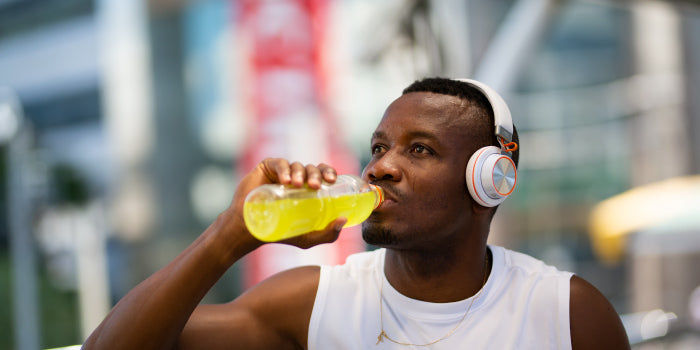
Can Energy Drinks Affect Your Sex Drive?
|
|
Time to read 4 min
|
|
Time to read 4 min
There’s something we need to be clear about: we live in a world that prioritizes productivity . We constantly gain access to more tools and resources designed to help us optimize our time, all in the name of producing faster and more efficiently. That’s where energy drinks come in. They’ve become a daily go-to for millions of people. Packed with caffeine, taurine and other stimulants, they promise to boost energy, focus and physical performance.
But what happens when we carry that stimulation into the realm of sexuality? Could these drinks influence your sex drive or even your performance in bed? In this article, we’ll explore that question through the lens of science and sexology. So if you’re one of the many fans of these popular beverages, keep reading.
Energy drinks contain a mix of ingredients classified as stimulants, with the most common being caffeine, taurine, guarana, ginseng… and high amounts of sugar. Caffeine is the star ingredient, often found in quantities exceeding 80 mg per can. That’s as much or more than a strong cup of coffee. Yes, a cup of coffee and a can of cola are pretty much on the same level.
Taurine, on the other hand, is an amino acid involved in various neurological and cardiovascular functions . Although it’s naturally present in the human body, its combined effects with other stimulants are still not fully understood. Guarana and ginseng are also used for their energizing properties and their reputation as natural aphrodisiacs—this is why many herbal teas that claim to improve erections include ginseng.
Now it’s time to look at how these compounds affect our intimate lives. Caffeine acts as a central nervous system stimulant, which typically leads to a temporary boost in alertness, energy and arousal. Some studies have looked into its impact on sexual function, particularly in men. For instance, a study published in PLoS One (Lopez et al., 2015) found that moderate caffeine consumption (around 170–375 mg per day) was linked to a lower prevalence of erectile dysfunction in adult men compared to those who didn’t consume caffeine. Sounds like a win, right?
However, this effect seems to depend on factors like dosage, overall health and individual tolerance . Excessive intake can actually backfire: raising anxiety levels, making it harder to focus, and negatively affecting sexual response. In women, the link between caffeine and sex drive isn’t as well documented, although mixed effects have been reported when it comes to arousal and mood.
Taurine has traditionally been linked to improvements in cardiovascular and muscular function. Some animal studies suggest that taurine may have a positive effect on libido and erections by enhancing blood flow and supporting central nervous system health (El Idrissi & Trenkner, 2004). However, evidence in humans remains limited and inconclusive.
In practical terms, the combination of taurine with caffeine and other stimulants might lead to a temporary energy spike, but it’s unclear whether that translates into a real, lasting boost in desire or sexual performance. In some cases, overstimulation can result in insomnia, irritability, or heart palpitations —effects that can clearly interfere with sexual well-being. Once again, we’re dealing with an ingredient whose impact depends on a range of factors.
A systematic review published in Frontiers in Psychology (Hoffman et al., 2013) on the effects of caffeine and other stimulants found in energy drinks concluded that these substances can significantly enhance physical and mental performance. However, it also warned about the risks of overuse, such as increased blood pressure, sleep disturbances and anxiety. All of which can negatively impact sexual function.
Another relevant study, conducted by Owen et al. (2008), found that the combination of caffeine and taurine may boost alertness and reduce fatigue, but it did not show any significant effect on factors directly related to sexual desire.
In short, the science suggests that there may be a mild and temporary effect on sex drive following consumption of these substances, but there is no strong evidence to support their use as sexual enhancers . In fact, in excessive amounts, they may even work against your intimate performance.
Beyond their connection to sexuality, excessive consumption of energy drinks can have health consequences that are worth mentioning. Among the most common side effects are:
Heart palpitations and arrhythmias.
Increased blood pressure.
Sleep disturbances.
Anxiety and mood swings.
Psychological dependence or tolerance.
These symptoms not only affect day-to-day well-being, but they can also directly impact sexual health: lowering desire, interfering with erections or making emotional connection with a partner more difficult. So, as with many things we consume in life: in excess, it stops being good for your overall (and sexual) health .
The impact of energy drinks on sex drive is, at best, ambiguous. While some ingredients like caffeine and taurine may provide a temporary boost in stimulation, there isn’t enough evidence to consider them effective tools for enhancing sexual function.
Experts in the field recommend focusing on a healthy lifestyle: balanced nutrition, regular exercise, good sleep habits and a healthy relationship with your sexuality. What should be clear is this: energy drinks can be part of your routine in moderation, but they shouldn’t be used as sexual enhancers. Desire is a complex, multifaceted phenomenon, and addressing it requires more than just cracking open a can.
Lopez, D. S., et al. (2015). Caffeine intake and erectile dysfunction in US men: Results from NHANES 2001-2004. PLoS One, 10(4), e0123547.
El Idrissi, A., & Trenkner, E. (2004). Taurine as a modulator of excitatory and inhibitory neurotransmission. Neurochemical research, 29(1), 189–197. https://doi.org/10.1023/b:nere.0000010448.17740.6e
Higgins, J. P., Babu, K., Deuster, P. A., & Shearer, J. (2018). Energy Drinks: A Contemporary Issues Paper. Current sports medicine reports, 17(2), 65–72. https://doi.org/10.1249/JSR.0000000000000454
Owen, G. N., Parnell, H., De Bruin, E. A., & Rycroft, J. A. (2008). The combined effects of L-theanine and caffeine on cognitive performance and mood. Nutritional neuroscience, 11(4), 193–198. https://doi.org/10.1179/147683008X301513


